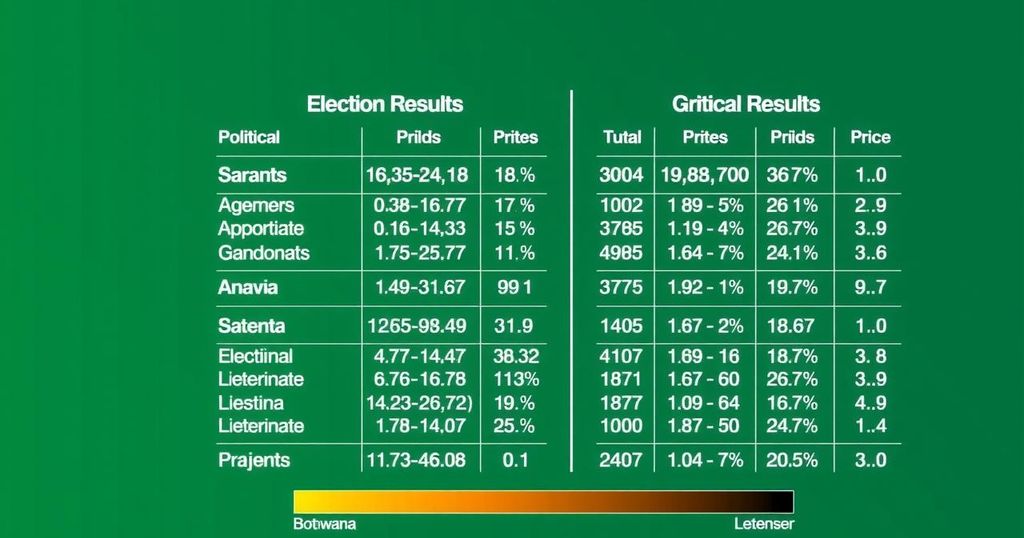The Botswana Democratic Party has been unexpectedly defeated in recent elections, leading to the rise of the Umbrella for Democratic Change coalition, led by Duma Boko. This shift reflects widespread public dissatisfaction with economic conditions, particularly high unemployment and healthcare access. President Masisi acknowledged the BDP’s failures and will step aside, highlighting a demand for new leadership focused on economic diversification.
In a remarkable turn of events in Botswana’s political landscape, the Botswana Democratic Party (BDP), which has held power since the nation gained independence in 1966, has been ousted in the recent elections, marking a historic shift towards a new governance structure under the Umbrella for Democratic Change (UDC) led by Duma Boko. This transition not only signifies a pivotal moment in Botswana’s democratic evolution but also presents challenges concerning the country’s economic direction amidst pressing economic issues and the public’s growing desire for diversification beyond mineral dependency. Botswana’s political history has been characterized by the dominance of the BDP, which maintained a steady grip on power through changing leadership. However, the BDP’s recent electoral loss has drawn attention to the growing dissatisfaction among citizens, particularly concerning economic necessities. The UDC coalition emerged as a formidable force, claiming 28 out of 61 parliamentary seats and winning a crucial majority of constituencies. This coalition, which amalgamated several opposition parties, has clearly resonated with a population increasingly weary of the status quo. The BDP’s defeat can largely be attributed to various factors, notably the decline in global diamond demand, which severely impacted Botswana’s economy—highly reliant on diamond exports. The nation, being the second-largest diamond producer globally, faces a pressing economic dilemma as unemployment rates soared above 27%, especially among the youth. Citizens have expressed their disappointment with the incumbent government’s inability to adequately address these pressing socioeconomic issues, including high unemployment, shortages of essential medicines in healthcare facilities, and the rising cost of living. During his election campaign, President Mokgweetsi Masisi acknowledged the need for policy reform but failed to convince voters that his administration could alleviate the ongoing economic difficulties. In light of the overwhelming response from the electorate, Masisi confessed at a recent press conference, “We got it wrong big time in the eyes of the people… I will step aside.” These candid admissions reflect a clear misjudgment regarding the sentiments of the electorate and their anticipations for a more responsive government. Conversely, Mr. Boko, leveraging public dissatisfaction, positioned himself as a proponent of change. His campaign emphasized a transformative vision, promising to diversify Botswana’s economy and tackle youth unemployment through targeted initiatives. Boko’s prior political experiences, including his role as Leader of the Opposition, equipped him with the insights necessary to unite the opposition and put forth appealing proposals to the electorate. In the aftermath of this electoral upheaval, it becomes evident that the BDP’s once-unassailable foothold in Botswana politics has been considerably shaken. The electoral results signal a clear mandate for change, reflecting the populace’s demand for improved economic management and leadership focused on citizen welfare. As the UDC prepares to assume governance, the focus will undoubtedly shift towards delivering on its promises to foster economic resilience and address the pressing concerns of the citizens.
The political scenario in Botswana has traditionally been defined by the BDP’s lengthy tenure as the ruling party, doing so for nearly six decades since the nation’s independence. Botswana’s economy has largely thrived on its diamond industry, which has been a significant contributor to its GDP and export revenues. However, recent trends indicating a downturn in global diamond demand exposed vulnerabilities within this economic dependency. As unemployment rates spike and public discontent rises amidst unmet basic needs, the political landscape has begun to transform, paving the way for the UDC’s ascendance and a redefined approach to governance and economic strategy.
The ousting of the BDP is a significant political development in Botswana, emphasizing the electorate’s desire for change amidst economic uncertainties. The elections signify a broader demand for diversification and effective governance capable of addressing fundamental issues affecting citizens’ lives. As the UDC steps into power, it will need to fulfill its commitments to economic revitalization and job creation to sustain the trust placed in it by voters, while the BDP’s federal leadership must reckon with the implications of their legislative missteps and the shifting political tides that favor a more collaborative approach to governance.
Original Source: www.theeastafrican.co.ke






